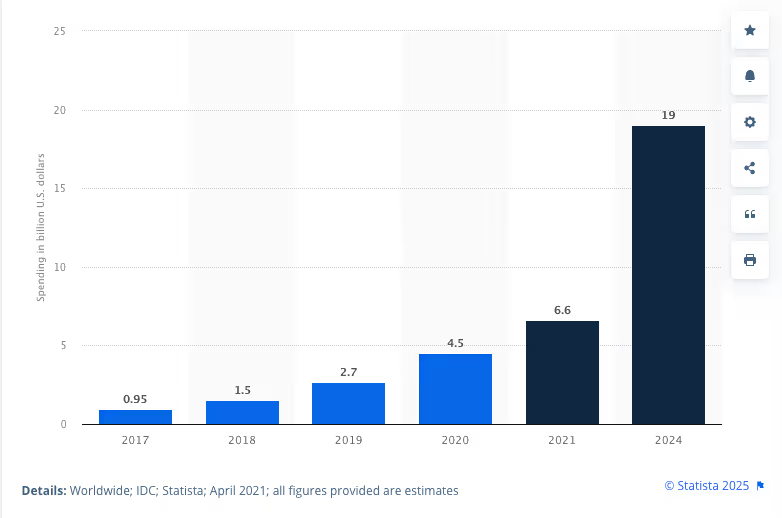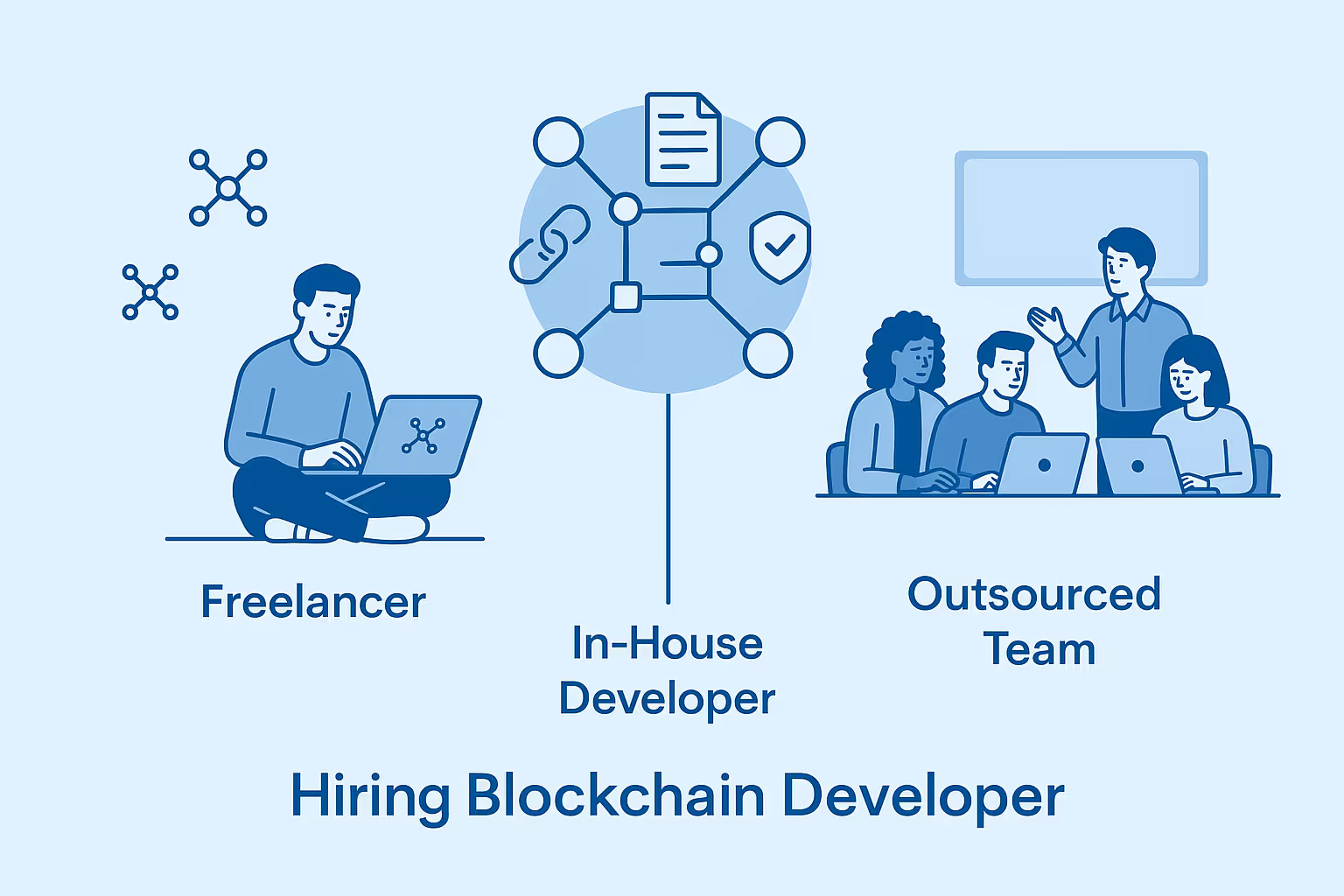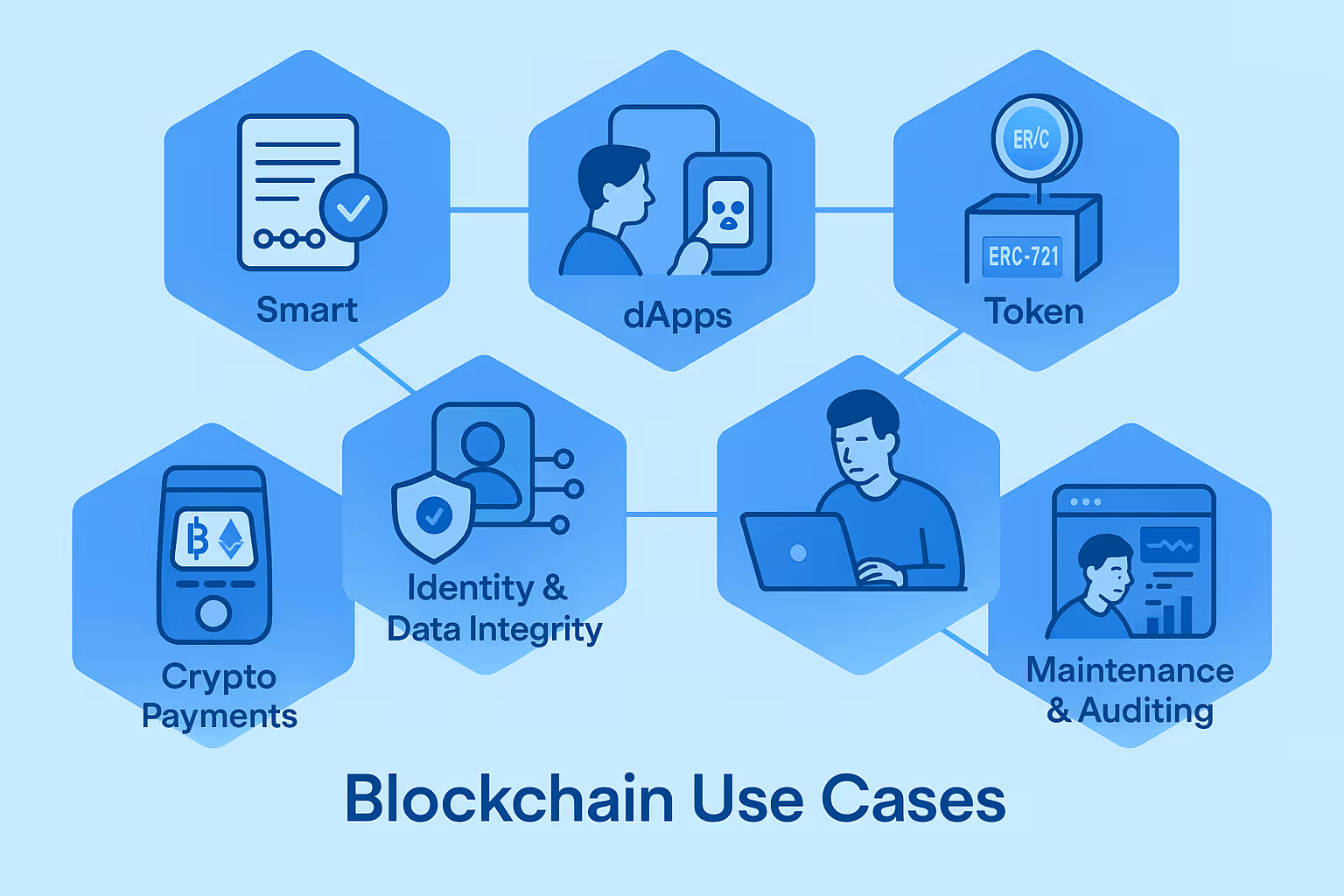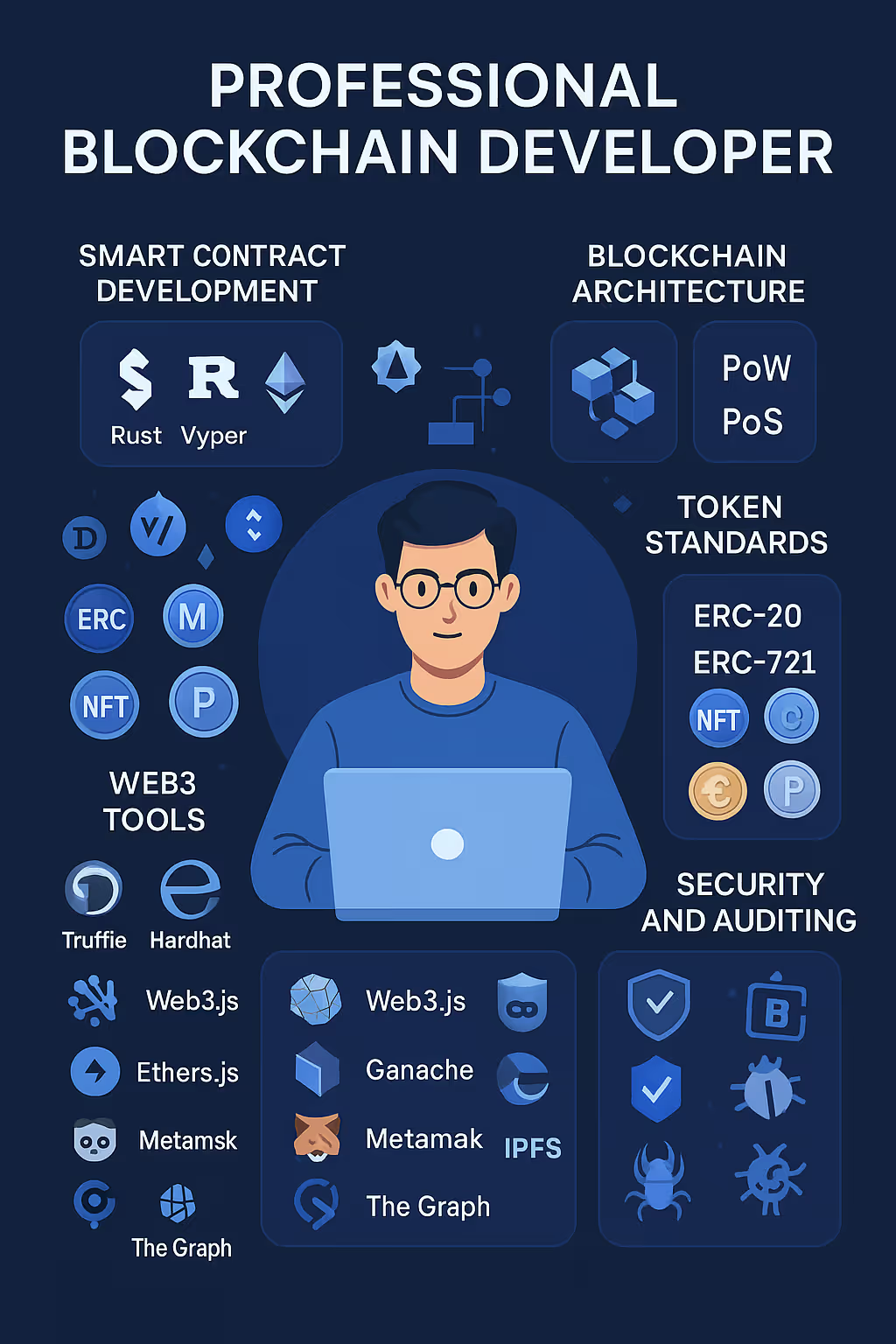
Looking to hire a blockchain developer? Discover essential tips to find the right talent for your project. Read the article for expert guidance!

If you’re thinking about building something with blockchain, like a decentralized app or a custom token, you’ll need the right developer to make it happen.
Blockchain technology is no longer just for crypto startups. It’s becoming a practical tool for businesses in many industries, especially those utilizing existing blockchain platforms. If you’re thinking about building something with blockchain, like a decentralized app or a custom token, you’ll need the right developer to make it happen.
But finding and hiring blockchain professionals can be complicated. There are a lot of skills involved, and the demand for experienced developers is growing fast.
In fact, companies around the world are investing billions in blockchain technologies. For example, worldwide spending on blockchain solutions increased from $6.6 billion in 2021 to $19 billion in 2024, with forecasts for 2021 and 2024. The talent pool is often not keeping up.

In this guide, we’ll walk you through what to know before you hire blockchain developer. We’ll look at when it makes sense to bring one on board, what the blockchain developer job description includes, how much it might cost to hire blockchain developer, and where to find the right fit. We’ll also explain why working with a trusted partner can make the process easier, faster, and more reliable.
To find blockchain developer, start by understanding what you actually need to build. Are you launching a token? Building a dApp? Writing smart contract development or adding crypto payments to your app? Each use case requires slightly different expertise, so getting clear on your goal is the first step.
Next, decide how you want to hire blockchain technology developer. You can work with a freelancer for a short-term task, hire a full-time developer if you’re building something long-term, or outsource the entire project to a development team.
Look for developers who are familiar with the blockchain platform you’re using—whether that’s Ethereum, Solana, or another chain—and who know how to write secure code in languages like Solidity or Rust. Experience with audits and understanding of blockchain architecture is a big plus.

If you want to move quickly and reduce risk, software outsourcing to a trusted company like Empat is a smart option. You’ll get access to skilled developers, plus project management and quality assurance support, without having to hire and train an in-house team.
In the rest of this guide, we’ll dive deeper into the key skills blockchain developers need, how much they typically cost, the different hiring options available, and why working with a partner like Empat can help you move faster and more confidently.
Hiring remote blockchain developers makes sense when you’re building something that relies on decentralized systems, transparency, or secure digital ownership. Below are the most common use cases where blockchain expertise in blockchain projects is very important.

Smart contracts are programs that run automatically on the blockchain when certain conditions are met. You’ll need a blockchain developer if you’re working on:
If your product needs to run on a decentralized network instead of centralized servers, you’ll need a dApp developer. Common features of dApps include:
Whether it’s a fungible token (like ERC‑20) or a non-fungible token (like ERC‑721), you’ll need blockchain expertise to create efficient smart contracts :
If you’re building a decentralized application that accepts or manages cryptocurrency, cryptocurrency developers can help you:
Blockchain can also support non-financial use cases like:
If you already have blockchain systems in place, you may need a developer with the following technical skills in a private blockchain :
Blockchain development is highly specialized. When you hire blockchain professionals, you should look for a mix of programming skills, understanding of cryptographic systems, and knowledge of how decentralized technologies actually work. Here are the key areas of expertise to look for when hiring a blockchain developer.

Smart contracts are the foundation of many blockchain apps for both IOS and Android platforms. When you find a mobile app developer, make sure they know how to write, test, and deploy smart contracts that are secure, efficient, and cost-effective to run.
The most common languages for this are:
Besides just writing functional code, smart contract developers should understand:
One mistake in a smart contract can be permanent and costly, so experience in testing solidity smart contracts here is critical.
Understanding the structure of a blockchain system and blockchain space is just as important as knowing how to code. An experienced blockchain developer should have a deep understanding and solid grasp of how blockchains work under the hood, including:
This knowledge helps developers make better architectural decisions, especially when choosing the relevant blockchain platform and building for performance and scalability.
Most blockchain projects involve some token, whether it’s a cryptocurrency, utility token, or NFT. To integrate blockchain solutions, developers should be fluent in major token standards, including:
Beyond just knowing blockchain programming languages, developers should understand:
This is essential if you're planning to launch a token-based product, like a crypto marketplace, reward system, or NFT platform.
Secure transactions are one of the biggest concerns in blockchain development. Since most blockchain code is public and immutable, there’s no room for errors once a contract is live.
A good blockchain developer should be familiar with:
Experience in past security audits or a track record of working on audited projects is a big plus.
Most blockchain applications also have a frontend that connects to the blockchain. A solid blockchain developer should be comfortable working with:
Being familiar with these tools helps top blockchain developers integrate smart contracts into user-facing apps and makes it easier to build, test, and launch full-featured decentralized products.
The blockchain development process is one of the most in-demand and specialized areas in tech today. Because of its complexity, finding qualified talent can be both competitive and costly. Prices vary based on the developer’s experience, the scope of your project, and the hiring process you choose. Here’s how the costs typically break down:
Hiring a freelancer is often the first option for startups needing short-term or clearly defined blockchain tasks, like writing a smart contract, conducting a security audit, or updating an existing dApp. Most blockchain freelancers charge between $50 and $150 per hour, with rates depending on their technical background, portfolio, and the chains they specialize in (Ethereum, Solana, etc.). This model to find stack developers is the most effective when you're confident about the project scope, especially for complex projects. and can manage the technical side independently.
For teams looking for consistent development power, hiring remote developers offers greater stability. Expect to pay $6,000 to $15,000 per month, depending on the developer’s experience and the regions you're hiring from. This approach can be ideal for long-term, in-house product development, but it also comes with overhead. You’ll need to handle sourcing, interviewing, onboarding, and ongoing management, not to mention the legal and tax obligations if hiring across borders.
Working with an outsourcing partner like Empat offers a middle ground—one that balances cost-efficiency with technical depth and delivery speed. Pricing typically ranges from $4,000 to $10,000 per month, depending on the scope of work, required tech stack, and whether you need additional specialists like project managers, designers, or QA engineers.
While hiring full-stack developers might seem like a larger upfront investment, it often results in better long-term value. Blockchain software development is high-risk—one security flaw can lead to lost user funds or failed product launches. With a blockchain technology team, you get access not only to skilled blockchain engineers but also to a full product delivery process that includes QA, testing, and timeline management.
In blockchain, cutting corners can be costly. Errors in smart contracts or poorly designed token mechanics can result in irreversible damage. When outsourcing to a web development company, you're not just paying for code—you’re investing in a process that reduces risk and delivers a higher-quality product, faster. For startups, especially those without technical co-founders, outsourcing to a proven software development company like Empat is often the most cost-effective and strategic decision.
Once you’ve decided to hire blockchain network developers, the next step is figuring out where to find the right person—or team—for the job. There are a few main hiring options, and each one comes with its pros and cons depending on your project’s size, budget, and timeline.
If you’re working on a small project or need help with a single smart contract, freelance platforms like Upwork or Lemon.io can be a good place to start. You’ll hire blockchain engineers with a range of experience and rates, and the hiring process is usually quick and flexible.
However, freelancers often juggle multiple clients, and managing the project is entirely up to you. You’ll need to handle communication, quality checks, and deadlines on your own, which can be risky for more complex or long-term builds.
Best for: Short-term tasks, budget-conscious projects, or quick audits.
Platforms like Toptal or Braintrust offer stack developers with deep blockchain expertise. These networks are known for quality, but that quality comes at a price, and they often require a minimum budget or long-term commitment.
If you already have technical leadership in place and just need a senior blockchain specialist to plug into your team, this can be a great fit. But for young businesses or non-technical founders, a startup software development might be more than you need (or can afford).
Best for: Companies with technical teams looking for elite, individual contributors.
Outsourcing blockchain development to a team like Empat offers a balance of speed, quality, and reliability. Instead of hiring and managing developers one by one, you get access to a full team—including project managers, developers, and QA specialists—who are already used to working together.
Outsourcing software development for startups, Empat specializes in helping companies bring digital products to market faster. We’ve worked across 12 industries and completed 300+ projects, including MVPs, mobile apps, and blockchain-powered platforms. For businesses without in-house tech leadership, this is a stress-free way to get expert-level blockchain development and stay on budget.
Best for: Startups and businesses that want fast, effective development with end-to-end support.
Hiring a full-time, in-house blockchain engineer can work well if you’re building a long-term ecosystem, such as your own blockchain protocol or enterprise-level infrastructure. This gives you full control over development, but it’s also the slowest and most expensive option.
Between recruiting, onboarding, training, and providing ongoing support, it can take months to get an internal blockchain team up and running. And in today’s competitive market, attracting top blockchain talent is difficult, even for well-funded companies.
Best for: Large-scale, long-term blockchain projects with stable budgets and internal tech leadership.
Startups need speed, flexibility, and technical expertise—but building an in-house blockchain architect team takes time, money, and technical oversight that many early-stage companies don’t have. That’s where outsourcing becomes a smart move. Hiring developers for startups, businesses get access to blockchain talent and product delivery processes that are already in motion.
Here's how it helps:
Outsourcing connects you with remote blockchain network developers who’ve already been tested on real-world projects. At Empat, the team has delivered everything from DeFi protocols and NFT platforms to smart contract infrastructures, ensuring your product is built securely and efficiently from day one. No trial and error, no guesswork—just reliable, production-ready code.
Hiring, training, and managing a full-time blockchain team can take months. For a startup trying to get to market quickly, that timeline is too slow. Outsourcing eliminates that delay. With a skilled blockchain development team, you immediately plug into a team that’s ready to go, with the right mix of backend software engineering, smart contracts, and Web3 experts.
Blockchain development is technical, but project management is just as important. Working with an agency means you also get a dedicated project manager who keeps everything on track, and quality assurance engineers who test and validate every release. This ensures faster sprints, fewer bugs, and less time spent managing developers directly.
Early-stage startups often need to move quickly, validate ideas, and pivot if needed. Outsourcing allows you to build an MVP or pilot version of your blockchain product without the long-term cost and commitment of full-time employees. Once your idea gains traction, you can scale your team with more confidence.
Running a project and creating blockchain solutions in-house means dealing with contracts, taxes, benefits, dev environments, and tools. Outsourcing removes much of this operational burden. Skilled blockchain developer teams handle the legal, technical, and team setup, so you can focus on vision, product strategy, and growth.
With a trusted partner like Empat, startups can bring blockchain ideas to life quickly and securely, without getting stuck in the weeds. It's an ideal setup for fast-moving teams looking to reduce risk and go to market with confidence.
{{first}}
Finding the right blockchain developer means digging deeper than just technical checklists. You need someone who understands the tech stack, knows how to write secure, scalable code, and can work closely with your team to deliver a product that actually works in the real world. Here are the questions that can help you uncover the right fit.
Blockchain development isn’t one-size-fits-all. Ethereum, Solana, Binance Smart Chain, and other platforms each come with their own languages, standards, and tooling. Ask which ecosystems the developer has worked with the most. You should also explore their comfort level with tools like Hardhat, Truffle, Ethers.js, and Web3.js. The answer will help you assess how quickly they can adapt to your tech stack.
This question is about more than code—it shows you how the developer thinks. A good candidate should be able to clearly explain what the contract does, how it handles edge cases, and how they ensured it was secure and efficient. Look for real examples of decision-making, optimization, and problem-solving.
Security is critical in blockchain. Once something is deployed to the blockchain, there’s no room for errors. Ask how the developer tests their contracts, which audit tools they use (such as Slither or MythX), and whether they’ve worked with third-party auditors before. Their approach to preventing vulnerabilities tells you a lot about their professionalism and risk awareness.
If your product includes a token, staking, liquidity pools, or any kind of decentralized finance logic, make sure the developer understands the mechanics behind it. Ask whether they’ve worked on similar DeFi products, how they designed token distribution or incentives, and if they understand how tokenomics impacts user behavior.
Even the best blockchain code won’t succeed if it doesn’t integrate well with the rest of your product. Make sure the developer can work across functions—whether it's syncing smart contracts with a frontend, using APIs, or collaborating with graphic designers and product managers. A strong communicator who can work cross-functionally is much more valuable than a siloed coder.
These questions give you a clearer picture of not just what a developer can do, but how they work, what they value, and how they’ll contribute to your product’s success. If you choose a partner like Empat, you get answers to all of these up front, through a team with verified experience, a proven process, and a strong track record across industries.
Blockchain is more than a trend—it’s reshaping how digital products are built and trusted. But in a space where code is immutable and mistakes can cost millions, getting the right developer isn’t optional—it’s essential.
Whether you're building an NFT marketplace, launching a DeFi platform, or integrating blockchain into your existing business model, the success of your product depends on the people behind it. Hiring the wrong freelance blockchain developers can slow you down, introduce security risks, or derail your entire roadmap. The right one can help you launch faster, build smarter, and scale with confidence.
That’s why more startups and growing companies are turning to trusted partners. With a team of experienced blockchain network developers, product managers, and QA specialists, Empat helps you turn bold ideas into secure, scalable blockchain products—without the headache of building a team from scratch.
If you're ready to explore blockchain development without the guesswork, get in touch with Empat today.
The cost to hire someone to build a blockchain application can vary significantly based on the developer’s technical expertise, project complexity, and geographic location. Here's a general breakdown:
If you’re hiring an agency or a development firm, costs may range from $20,000 to $150,000+ for an MVP (minimum viable product), depending on the scope. Complex dApps involving smart contracts, tokenomics, and blockchain integrations (like wallets or NFTs) will push costs higher.
The total cost to develop a blockchain-based application typically ranges from $20,000 to over $250,000, depending on several key factors:
Budget for post-launch support and ongoing development, as blockchain apps often evolve rapidly.
Hiring a blockchain developer involves several key steps:
Look for developers with strong experience in smart contract development, Web3 frameworks, and a portfolio of past blockchain or DeFi projects.
Getting a complete blockchain solution built—such as a dApp, decentralized exchange, NFT platform, or enterprise supply chain system—can cost between $30,000 and $250,000+, depending on several components:
A simple token-based dApp might cost around $30K, while a full-scale DeFi protocol or metaverse application could exceed $200K, especially if audits, multi-chain deployment, and scaling are required.


Hire a vetted blockchain developer today and take the first step toward building your decentralized application.
